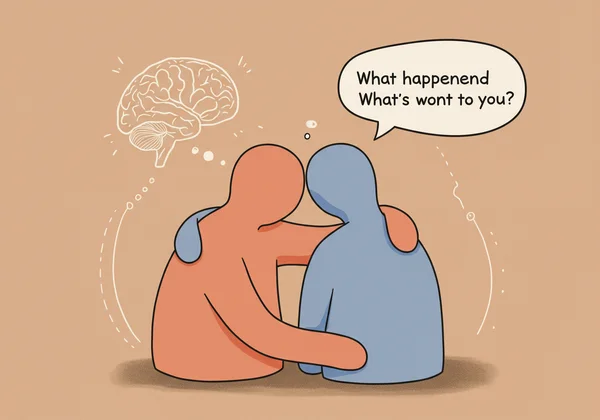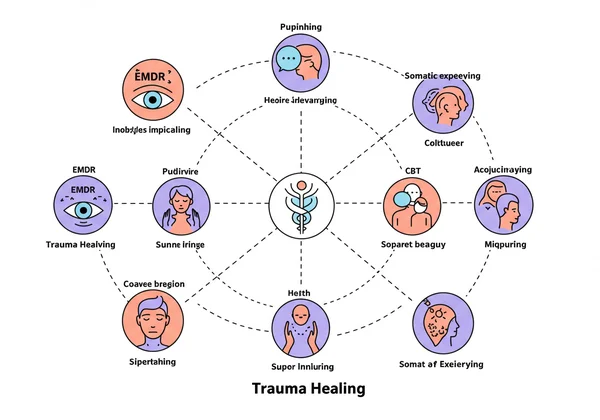Trauma-Informed Therapy: Your Guide to Healing After a Trauma Test
September 29, 2025 | By Nora Hayes
Are you grappling with past experiences, feeling the weight of unresolved emotions, or struggling to find stability? For many, understanding the root of these feelings is the first step. If you've ever asked yourself, How do I know if I have trauma?, you're already on a path of self-discovery. Perhaps taking an assessment has validated your feelings, and now you're considering the next courageous step: seeking professional support. Finding the right therapist can feel overwhelming, but a professional who specializes in trauma-informed therapy can make all the difference. This guide will walk you through finding the specialized help you deserve, empowering you on your journey toward healing.

Why Trauma-Informed Care is Essential for Your Trauma Healing Journey
Navigating the world of therapy can be confusing, but understanding the term "trauma-informed" is crucial. It’s not just a buzzword; it’s a fundamental approach to care that prioritizes your safety, well-being, and empowerment. It recognizes the widespread impact of trauma and understands potential paths for recovery.
What Does "Trauma-Informed" Really Mean?
At its core, a trauma-informed approach is built on a simple but profound understanding: it assumes that an individual is more likely than not to have a history of trauma. Instead of asking, "What's wrong with you?" a trauma-informed professional asks, "What happened to you?" This shift in perspective creates a safe space where you won’t be judged or re-traumatized. It's about recognizing that your current struggles, whether they are anxiety, depression, or relationship difficulties, may be adaptive responses to past adverse experiences.
The Benefits of Specialized Trauma Therapy
Choosing a therapist trained in trauma offers significant advantages. These professionals understand how trauma affects the brain, body, and nervous system. They are equipped with specific tools and techniques to help you process difficult memories without becoming overwhelmed. The benefits include feeling truly seen and heard, learning to regulate your emotions, rebuilding a sense of safety in the world, and reducing the physical and emotional symptoms of unresolved trauma. This specialized support fosters resilience and paves the way for post-traumatic growth.

Recognizing a Trustworthy Trauma Professional
A trustworthy trauma professional creates an environment of safety, collaboration, and transparency. Look for someone who is patient, compassionate, and respects your boundaries. They should explain their methods clearly and involve you in treatment planning, ensuring you always feel in control of your healing journey. They will never push you to share details you're not ready to discuss and will focus on building your internal resources first. You can begin to understand your own needs by taking an initial step with our online trauma test.
Exploring Effective Therapy Types for Trauma & PTSD
When seeking therapy for PTSD and other trauma-related conditions, it's helpful to know that there are several evidence-based methods. A good therapist will often integrate multiple approaches to tailor treatment to your unique needs. Here are some of the most effective and widely recognized modalities.

Understanding EMDR Therapy for Trauma & PTSD
Eye Movement Desensitization and Reprocessing (EMDR therapy) is a powerful psychotherapy approach designed to alleviate the distress associated with traumatic memories. Using bilateral stimulation, such as guided eye movements, EMDR helps the brain resume its natural healing process. Many people find it allows them to process traumatic events without having to talk about them in extensive detail, making it a preferred option for those who find traditional talk therapy challenging.
Cognitive Behavioral Therapy (CBT) for Trauma
Cognitive Behavioral Therapy, particularly a specialized form called Trauma-Focused CBT (TF-CBT), is another highly effective treatment. CBT for trauma helps individuals identify and change negative thought patterns and behaviors linked to their trauma. It provides practical skills for coping with anxiety, managing triggers, and reframing distorted beliefs about oneself and the world. This approach empowers you with tangible tools to regain control over your life.
Somatic Experiencing and Body-Based Approaches
Trauma isn't just stored in the mind; it's held in the body. Somatic Experiencing and other body-based therapies focus on releasing this trapped traumatic stress from the nervous system. These methods help you gently build awareness of your bodily sensations and use that awareness to discharge pent-up fight, flight, or freeze energy. By reconnecting mind and body, you can restore your nervous system's natural balance and capacity for resilience. Exploring your responses with a childhood trauma tes can offer initial insights.
Other Therapeutic Modalities to Consider
The field of trauma therapy is always evolving. Other valuable approaches include Dialectical Behavior Therapy (DBT), which is excellent for building emotion regulation skills, and Internal Family Systems (IFS), which helps you understand and heal the different "parts" of yourself affected by trauma. Don't hesitate to ask a potential therapist about the modalities they use and why they might be a good fit for you.
Your Step-by-Step Guide to Finding a Trauma Therapist
Knowing how to choose a therapist is a critical skill. This practical guide breaks down the process into manageable steps, reducing the anxiety that often comes with starting the search. Remember, this is your journey, and you are in the driver's seat.

Where to Begin Your Search Online and Offline
Your search can start in several places. Online directories like the Psychology Today therapist finder, the EMDR International Association (EMDRIA), and the Somatic Experiencing Trauma Institute allow you to filter by specialty, location, and insurance. Don't underestimate the power of trusted referrals; your primary care physician may have recommendations. You can also contact your insurance provider for a list of in-network mental health professionals.
Key Questions to Ask Prospective Therapists
Before committing to a therapist, it’s wise to have a brief consultation call. This is your opportunity to interview them. Here are some key questions to ask:
- What is your experience and training in treating trauma?
- What therapeutic approaches do you use for trauma survivors?
- How do you ensure a client feels safe and in control during sessions?
- What does a typical first session with you look like?
- What are your fees, and do you accept my insurance?
Their answers will give you a sense of their expertise and whether their approach aligns with your needs.
What to Look For in a First Session
The first session is primarily about determining if it's a good fit. You should leave the session feeling respected, heard, and hopeful. A good therapist will focus on building rapport and gathering your history without pushing for traumatic details. They should explain the therapeutic process, discuss confidentiality, and collaborate with you on initial goals. The focus should be on establishing safety and trust.
Trusting Your Gut: When to Keep Looking
Ultimately, the most important factor is the therapeutic relationship. If you feel dismissed, judged, or unsafe for any reason, it is perfectly acceptable to seek another provider. Healing requires a strong, trusting alliance. Trust your intuition. The right therapist will feel like a compassionate, steady ally on your healing journey. It may take a few tries to find the right person, and that is okay. The first step is awareness, which is why a free trauma test can be a valuable starting point.
Taking the Next Step Towards Healing
Your journey starts with a single step, and our free, scientifically designed trauma test is here to help you take it, providing clarity and guiding you toward professional support. If you're ready to better understand your experiences and explore potential paths to healing, start your journey on our homepage today.
Frequently Asked Questions About Finding Trauma Therapy
What is the most accurate trauma test?
While no online tool can provide a diagnosis, a scientifically designed screening tool can be an incredibly accurate first step. The most helpful tests, like our scientifically designed trauma assessment, are developed with input from mental health professionals to help you identify potential trauma symptoms. They serve as a gateway to self-understanding and can be a great starting point for a conversation with a therapist. You can take our free test to gain personal insight.
How do I know if I have trauma, and should I see a therapist?
Trauma manifests differently for everyone. You might experience intrusive memories, avoidance of certain places or people, persistent negative emotions, irritability, or feeling constantly on edge. If you notice these signs impacting your daily life, relationships, or well-being, speaking with a therapist is a courageous and beneficial step. Our trauma response test can help clarify if what you're feeling may be linked to trauma.
Can you self-diagnose trauma, or do I need a professional?
It is not advisable to self-diagnose trauma. While you are the expert on your own experiences and feelings, a qualified mental health professional is needed for an accurate diagnosis. They can rule out other conditions and create a safe, effective treatment plan. A screening tool like our trauma assessment is meant to provide preliminary insight, not replace a professional evaluation.
How can therapy help heal from childhood trauma?
Therapy provides a safe relationship where you can begin to process painful childhood experiences that were often endured in isolation. A skilled therapist can help you understand how these early events affect your adult life, teach you coping skills to manage triggers, and guide you in grieving what was lost. It helps you build the secure attachment and self-worth you may have missed, empowering you to break cycles and heal.